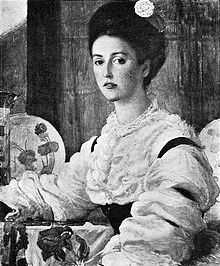Lucy Cavendish

Lady Frederick Cavendish (Lucy Caroline; née Lyttelton; 5 September 1841 – 22 April 1925) was a pioneer of women's education.
A daughter of George Lyttelton, 4th Baron Lyttelton, she married into another aristocratic family, the Cavendishes, in 1864. Eighteen years later her husband, Lord Frederick Cavendish, was murdered in Dublin by Irish nationalists. After his death she devoted much of her time to the cause of girls' and women's education, for which she was honoured in her lifetime with an honorary degree, and posthumously when, in 1965, Cambridge University named its first post-graduate college for women after her.
Biography
Lucy Cavendish was born at the Lyttelton family house, Hagley Hall, Worcestershire on 5 September 1841. She was the second daughter of George Lyttelton, 4th Baron Lyttelton and his wife, Mary, née Glynne, whose sister married W. E. Gladstone.[1] In 1863 she was appointed a Maid of Honour to Queen Victoria, whom she attended until marrying the following year.[2]
On 7 June 1864 she married Lord Frederick Cavendish, the second son of the Duke of Devonshire. They had no children. Cavendish was elected to Parliament in 1865 and was assassinated by Irish nationalists in the Phoenix Park Murders on 6 May 1882, the day on which he took the oath of office of Chief Secretary for Ireland.[1] Though devastated by the assassination, on the day before the ringleader was hanged she sent him the small gold crucifix she had long worn, as a token of her forgiveness.[3] Gladstone was greatly moved when she told him that she could bear the loss of her beloved husband "if his death were to work good to his fellow-men, which indeed was the whole object of his life."[2] She remained a firm supporter of home rule for Ireland.[1]
After Cavendish's death, Lucy Cavendish was active in the sphere of women's education. She was of President of the Yorkshire Ladies Council of Education from 1883 to 1912. She declined the offer of the post of Mistress of Girton College, Cambridge in 1884. She was a member of the Royal Commission on Secondary Education and was a founding member of the Council of the Girls' Public Day School Company, which had been founded by her father.[1] On 6 October 1904 she received the honorary degree of Doctor of Laws at the formal inauguration of the University of Leeds for "notable service to the cause of education".[4]
Lucy Cavendish died at her home, The Glebe, Penshurst, Tonbridge, on 22 April 1925. aged 83. She was buried in her husband's grave in Edensor churchyard, near Chatsworth.[1]
Lucy Cavendish College, Cambridge was named in her honour in 1965.[1] She was the great-aunt of one of its founders, Margaret Braithwaite.[5]
Notes
- ↑ 1.0 1.1 1.2 1.3 1.4 1.5 Boase G. C. "Cavendish, Lord Frederick Charles (1836–1882)" rev. H. C. G. Matthew, Oxford Dictionary of National Biography, Oxford University Press, 2004, online edition, October 2005, accessed 23 April 2013 (subscription or UK public library membership required)
- ↑ 2.0 2.1 "Obituary – Lady Frederick Cavendish", The Times, 23 April 1925, p. 14
- ↑ Lyttelton and Hart Davis, p. 40 – letter of 17 March 1960
- ↑ "The Papers of Lucy Cavendish".
- ↑ Renfrew, Jane M. "Who was Lucy Cavendish?". Rooms of Our Own - Lucy Cavendish College. Retrieved 1 March 2012.
References
- Lyttelton, George; Rupert Hart-Davis (1978). The Lyttelton/Hart-Davis Letters, Volume 5. London: John Murray. ISBN 0-7195-4381-9.
External links
- The Diary of Lady Frederick Cavendish (or Lady Lucy Cavendish) (blog) Edited by John Bailey with illustrations Vol. I and II, New York, Frederick A. Stokes Company Publishers, First Edition 1927